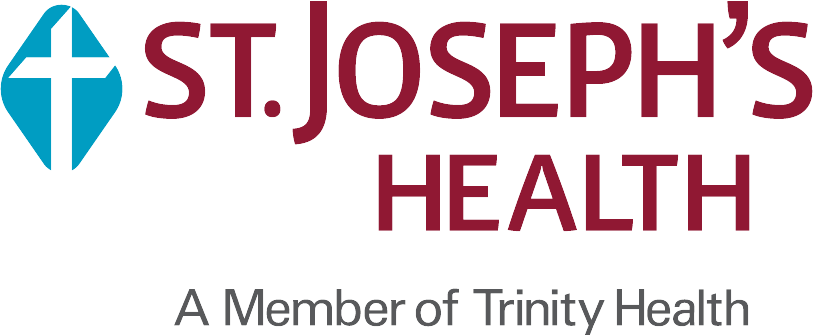Thyroid & Parathyroid
At St. Joseph’s our team of general surgeons perform more adult inpatient general surgeries than any other hospital in the region* and more adult inpatient general robotics surgeries than all five area hospitals. Research suggests that high-volume procedures result in improved patient outcomes. Our board-certified surgeons specialize in thyroid and parathyroid surgery. Following surgery, our magnet recognized nursing staff provide the best post operative care a patient could ask for.
Why the Procedure Is Performed
Parathyroid Gland Removal
- One or more of your parathyroid glands is producing too much parathyroid hormone. This condition is called hyperparathyroidism. It is often caused by a small non-cancerous (benign) tumor called an adenoma.
Thyroid Gland Removal
- A small thyroid growth (nodule or cyst)
- A thyroid gland that is so overactive it is dangerous (thyrotoxicosis)
- Cancer of the thyroid
- Noncancerous (benign) tumors of the thyroid that are causing symptoms
- Thyroid swelling (nontoxic goiter) that makes it hard for you to breathe or swallow
Before the Procedure
Parathyroid
Parathyroid glands are very small. You may need to have tests that show exactly where your glands are. This will help your surgeon find your parathyroid glands during surgery. Two of the tests you may have are a CT scan and an ultrasound.
Before surgery, an anesthesiologist will review your medical history with you and decide what type of anesthesia to use. The anesthesiologist is the doctor who will give you the medicine that allows you to sleep and be pain-free during surgery and who monitors you during surgery.
Tell your surgeon:
- If you are or might be pregnant
- What medicines, vitamins, herbs, and other supplements you're taking, even ones you bought without a prescription
During the week before your surgery:
- Fill any prescriptions for pain medicine and calcium you’ll need after surgery.
- You may be asked to stop taking aspirin, ibuprofen (Advil, Motrin), vitamin E, warfarin (Coumadin), and any other drugs that make it hard for your blood to clot.
- Ask your surgeon which drugs you should still take on the day of your surgery.
On the day of your surgery:
- Follow instructions about not eating and drinking.
- Take the medicines your surgeon told you to take with a small sip of water.
- Arrive at the hospital on time.
Thyroid
During the weeks before your surgery:
- You may need to have tests that show exactly where the abnormal thyroid growth is located. This will help the surgeon find the growth during surgery. You may have a CT scan, ultrasound, or other imaging tests.
- Your doctor may also do a fine needle aspiration to find out if the growth is noncancerous or cancerous. Before surgery, your vocal cord function may be checked.
Several days to a week before surgery:
- You may be asked to stop taking medicines that make it harder for your blood to clot. These include aspirin, ibuprofen (Advil), naproxen (Aleve), clopidogrel (Plavix), warfarin (Coumadin).
- Fill any prescriptions for pain medicine and calcium you will need after surgery.
- Tell your health care provider about all the medicines you take, even those bought without a prescription. This includes herbs and supplements. Ask your provider which medicines you should still take on the day of surgery.
- If you smoke, try to stop. Ask your provider for help.
On the day of surgery:
- Follow instructions about when to stop eating and drinking.
- Take any medicines that your provider told you to take with a small sip of water.
- Be sure to arrive at the hospital on time.
After the Procedure
Parathyroid
Often, people can go home the same day they have surgery. You can start your everyday activities in a few days. It will take about 1 to 3 weeks for you to fully heal.
The surgery area must be kept clean and dry. You may need to drink liquids and eat soft foods for a day.
Call your surgeon if you have any numbness or tingling around your mouth in the 24 to 48 hours after surgery. This is caused by low calcium. Follow instructions about how to take your calcium supplements.
After this procedure, you should have routine blood tests to check your calcium level.
Thyroid
You will probably go home the day after surgery. In rare cases, you may need to spend up to 3 days in the hospital. You must be able to swallow liquids before you can go home.
Your provider may check the calcium level in your blood after surgery. This is done more often when the whole thyroid gland is removed.
You may have some pain after surgery. Ask your provider for instructions on how to take pain medicines after you go home.
You will likely be able to get up and walk on the day after surgery. It should take about 3 to 4 weeks for you to fully recover.
Follow any instructions for taking care of yourself after you go home.
Outlook (Prognosis)
People usually recover soon after this surgery. Recovery may be fastest when less invasive techniques are used.
References
Quinn CE, Udelsman R. The parathyroid glands. In: Townsend CM, Beauchamp RD, Evers BM, Mattox KL, eds. Sabiston Textbook of Surgery: The Biological Basis of Modern Surgical Practice. 20th ed. Philadelphia, PA: Elsevier; 2017:chap 37.
Wang TS, Sosa JA. Minimally invasive parathyroidectomy. In: Cameron JL, Cameron AM, eds. Current Surgical Therapy. 11th ed. Philadelphia, PA: Elsevier Saunders; 2014:1393-1398.
